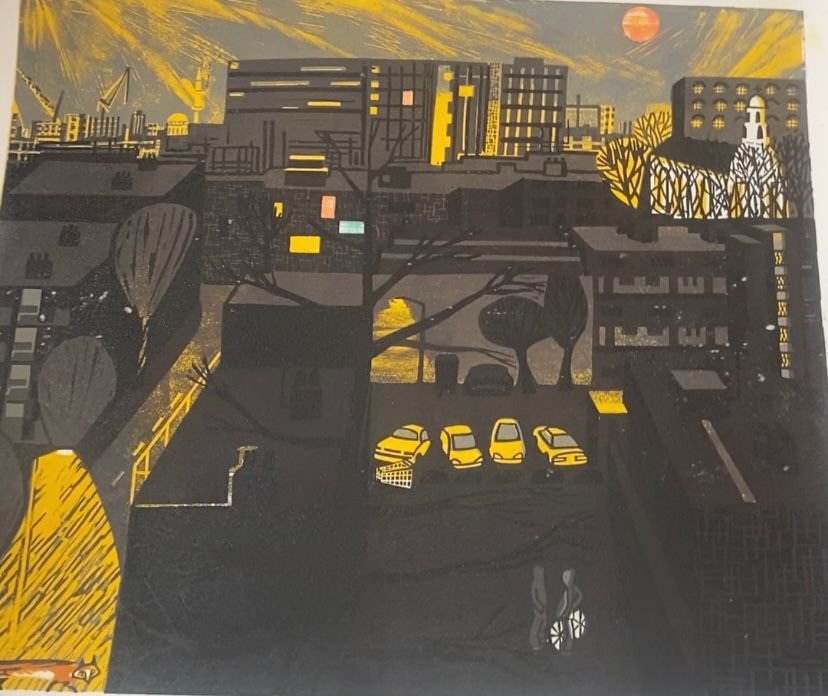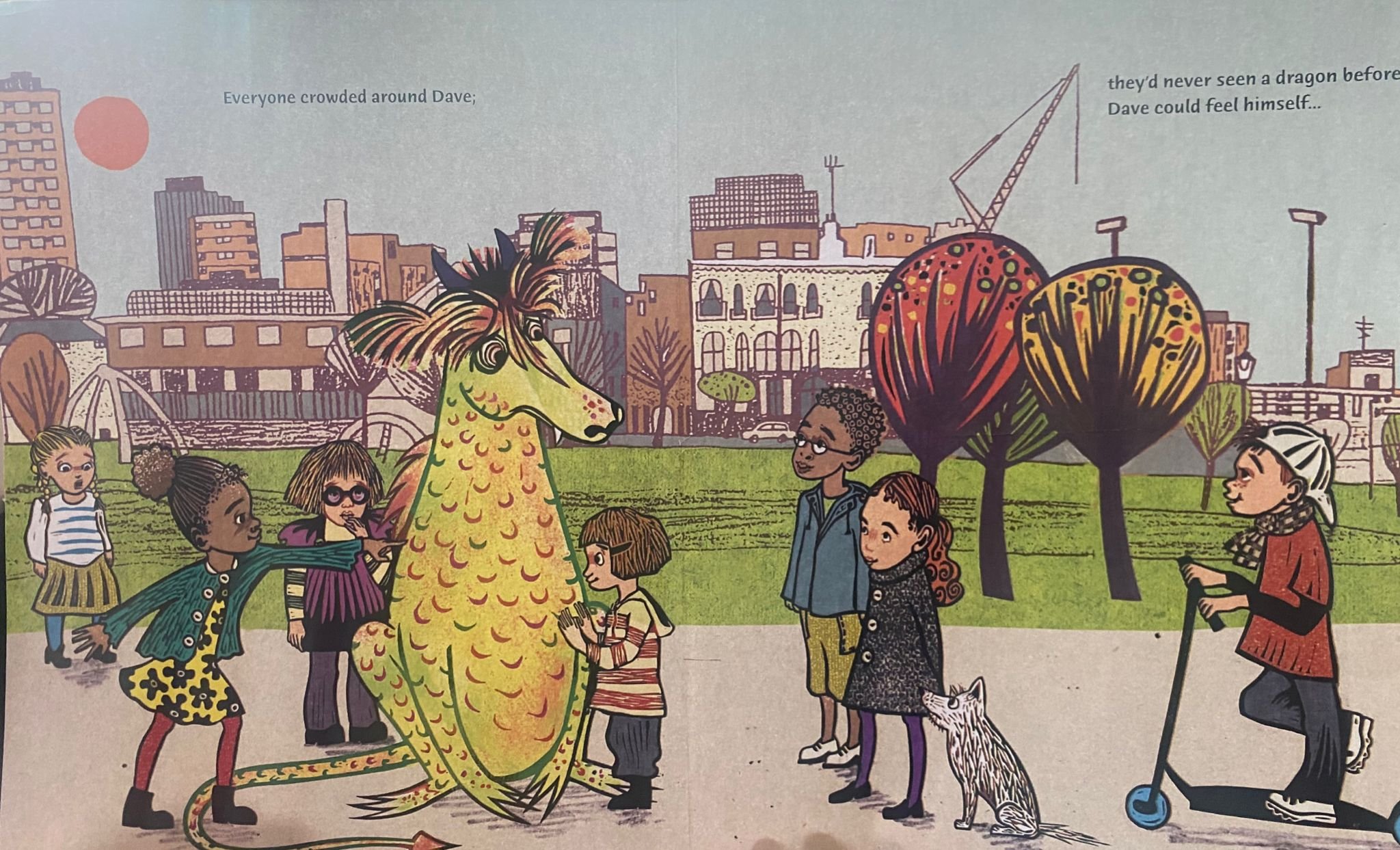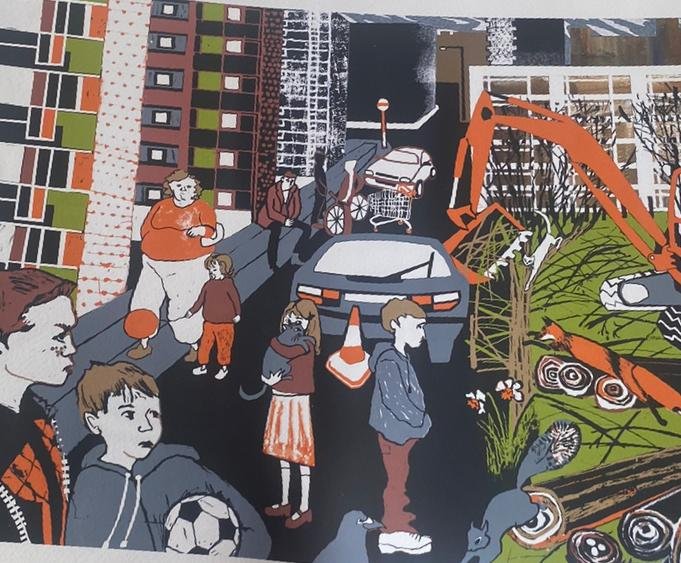Street scenes, building a sense of community and turning the unseen into heroes
I felt instantly at home after meeting Sarah Adams, she was warm and gracious and we hit it off straight away. Our encounter was through her partner who fixed my musician boyfriend's trumpet, which I swear is not a euphemism for something else, he actually repairs instruments.
Anyway, after a few catch ups with heart-warming new friends, I discovered Sarah had done more than a stint in the world of illustration, but was adamant that wasn’t ‘happening’ anymore. Out of curiosity I asked to see some of her work, but she became shy and introverted, only adding to my intrigue.
In the end she did let me see one or two pieces, and I was bowled over with what she’d presented, it had such an impact. I felt like I knew the places on the page she’d drawn, the people she’d depicted. I was brought up in Hackney, the place in question, so her ability to show it off with such a visceral energy kinda broke me.
I was hell bent on speaking to Sarah further not only to bring her work to the forefront, but also to lift the proverbial shadow she’d casted over it.
Once we’d aligned our schedules I rocked up to her place with a packet of custard creamed biscuits in one hand, and a note full of questions in the other, and it wasn’t long until she jumped in to tell me about her work-space. Yeah this bit is my corner, I have all my special books, my paints, and this is how I organise it. It very much says a lot about me…course it’s a mess, and I think it's good to show it in a complete and utter mess.
I add that most artists liked working in a disorganised functional space which she considers and smiles at. Totally, but this has evolved over 10 - 20 years actually, I was doing a lot of photoshop on my computer which is why I have this big screen, I did a few books which I had to relay and send online.
Books? This is news to me. We've spoken a few times and Sarah’s never mentioned about being published, not that she’s obliged to but this revelation feels even more of a privilege, to see her ready to share something she’d been initially so modest about. I was going through the drawers to show you what I have and it’s a bit of a mish mash, there are loads of really old stuff, but it’s all been a journey.
What has led you to this point? Oh god it goes right back to Central Saint Martins in London when I did a post grad in illustration, which was about 30 years ago and it sort of built from there. I went on to do magazine illustration, then I started to get into children’s books because someone saw my work, and I ended up working for Walker books. I went on to do a post grad in children’s illustration after that.
Sarah's partner comes in as she’s talking and she politely tells him that she’s busy, before seamlessly carrying on from where she left off. So I took some key bits out, like the sketch book I showed you.
She begins to flick through a series of drawings of kids playing, sitting, jumping and I take the opportunity to ask if she can remember when her love of art started?
When I was around 15 I had to start looking at what to do for a career, and I remember looking through these books and one of them said something about being an illustrator, and I never thought of doing that. At that point the direction changed, and I went and did an art foundation.
I hate to ask the next question especially as I can see Sarah is surrounded by a sweet shop of memories, but I wonder if she can choose three pieces that represent her work. She goes ahead and rummages through papers in her blue dungarees and red long sleeved top, to show me a lino cut print she made. Ok, so, this is my estate…I just love the view outside my window and this is it at night. The lino print has many elements from intricate markings of light and dark, the London’s skyline in the distance, the fox below with an abandoned shopping trolly in the scene and I get the sense of what is often synonymous in Sarah's work whether she knows it or not, and that’s to make the often forgettable or lost subject the hero of her work.
Oh and there’s this, it’s based around the fairytale ‘The red shoes’ she says drawn to another of her pieces. I basically wanted to update the story because I’ve always loved it. The expressions that Sarah captures in this eclectic street scene where the protagonist Karen is on the run, is full of character; and I’m so taken with the illustration’s punchy authenticity that I can almost smell the chip fat clinging to the pavement and hear reggae bouncing in the air. I am transported.
Sarah finally sets her heart on the third piece with a project called ‘Lucas Eden’. It’s about a boy and his grandmother who moved to an estate like this. Sarah is now on her feet, directing my gaze outwards to a grey sky and concrete jungle of 30 or so flats below, the setting has an important relationship with the story she’s about to embark on.
So, Luca and his grandmother moved here from eastern Europe, I haven’t specified where exactly but they’ve been given a place to stay. They look out of the window and see land, and want to create a garden because they feel isolated coming from a different country. But this land is in danger because the authorities want to build on it, so they try to save it. Sarah goes on to talk about where she lives and what that means to her.
There’s been a movement on our estate and in our community garden about bringing people together. Local people have taken ownership of that around here, they’ve not been led by councils or paid people, they’ve taken initiative themselves to expand it. It’s very much resident led here, and longer lasting because of it.
I want to know what Sarah believes makes a good illustrator? Having a sense of place, I think you can take inspiration from your own experience, where you live, or the people you know. I think it makes it more personal, now most of my work is based around London but in some cases in children’s books they like to sell more internationally and they don’t always encourage a sense of place because they think it limits the sale of the book, so it can be a bit generic, but personally I feel like it’s more interesting if there is a sense of place.
Sarah looks out of her window as she’s done so many times today, half with concern and the other with a palpable sense of happiness. I’ve gathered that her starting point has a lot to do with where she’s from and what’s in her community, but she also highlights how our differences can have a great effect on the people who live there.
This is apparent in ‘Dave and Violet’, one of Sarah's published children’s books, about a little girl helping a dragon fit in. This story is set in Shoreditch park, and I dunno, I sometimes think about
Dragan -Dragan is Sarah's partner who’s Serbian - I think he’s never felt quite 100% accepted here, and I’m quite protective of that.
Sarah's body language changes slightly as she comforts herself by wrapping an arm loosely around her waist, and the other on her opposite shoulder.
When I was a child I was very quiet and I didn’t really say much, and I remember the harder I tried to please the other kids the harder it was for me, I feel like they disliked me more. I remember feeling frustrated and how unhappy I was; I was being bullied and that...and this character, Dave the dragon, he wants to help but the harder he tries the worse it is. And he’s trying so hard that he gets nervous and starts to heat up, flames come out of him and he makes it even worse. That’s based on how I felt as a kid. So it’s a mix of things, and I guess Violet is like me…but I think a lot of artists base their work on their own experiences, something real.
Sarah shows me another of her children’s book called ‘Gary and Ray’ and I see the familiar theme loneliness being probed again, as she flicks through the pages there’s a hint of surprise in her voice as she admits I seem to write characters who are lonely and don’t belong, I guess as a kid I felt lonely and I wanted to belong.
I think living around here on the estate there’s a lot of people that are isolated and forgotten about, you don’t often see them but I know they are there.
I agree with Sarah that loneliness is not an easy state to live with, that it should be talked about more often and tackled head on, having said that I see many of her stories resonating with those reading them, as a reminder they are not alone and that hope is never too far away.
Sarah not only champions her often displaced characters with spirit and awareness, she also puts her money where her mouth is and is an active member of her community; and what I love about her work is its pure honesty and definite style.
She has a great ability to draw your eye across the page and hold a mirror up to the world she creates, whether it be a place outside your door or the subject that lives behind it. That’s what makes her work so special.





